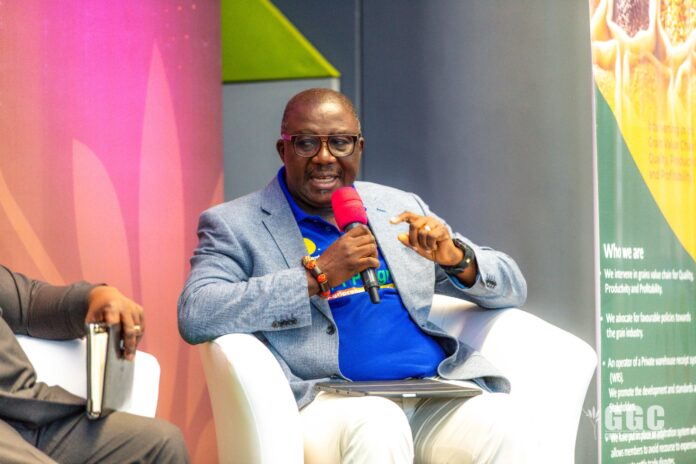Daniel Fahene Acquaye, CEO of leading agribusiness firm Agri-Impact Limited, says the challenges hindering Ghana’s agricultural sector will persist unless a multi-sectoral approach is adopted.
Speaking at the Ghana Grains Forum 2024 in Accra, Mr Acquaye stressed the need for collaboration across various ministries and departments to drive progress in the agricultural sector.
According to him, the Ministry of Agriculture alone cannot handle all the problems in the sector.
“The moment you segregate agriculture, it’s the first step toward failure. The reason we, as a country, have repeatedly invested in agriculture without seeing the desired results is that we treat agriculture and agribusiness in isolation, like separate islands. The Ministry of Agriculture alone cannot tackle all agricultural challenges.”
“For example, if you need a road leading to a production area, that falls under Feeder Roads, making the Ministry of Roads and Highways critical to agriculture. Similarly, if an agro-processing firm requires electricity, it involves the Ministry of Energy, he said.
He continued, “We need a multi-sectoral approach where various ministries and departments work together to address agricultural challenges. While the Ministry of Agriculture may show leadership, it can’t play every role.”
The forum, themed “Climate Change and Sustainable Food Security: Collaborative Responses to Ghana’s Grain Crisis,” brought together key industry players to discuss solutions to the country’s agricultural issues.
Mr. Acquaye also highlighted the country’s tendency to focus too much on challenges instead of developing innovative solutions.
“We often dwell on the problems during discussions. Towards the end, with tiredness setting in, is when we start talking about solutions. We already know the challenges of agriculture—every textbook, from class one to PhD, lists them. What we need now are innovative solutions and a commitment to implement them.”
He used the opportunity to showcase the success of the Harnessing Agricultural Productivity and Prosperity for Youth (HAPPY) Program, which has created over 90,000 jobs for young people in the agricultural sector.
The program, a partnership between Agri-Impact Limited and the Mastercard Foundation, aims to create 326,000 jobs in rice, soybean, tomato, and poultry value chains for young people aged 15 to 35 within the next four years, with 70% of the beneficiaries being women and persons with disabilities.
HAPPY is implemented by a consortium of eight partners, led by Agri-Impact Limited.
The partners include NewAge Agric Solutions, the Ministry of Food and Agriculture (MoFA), the National Service Scheme (NSS), Catholic Relief Services (CRS), Jobberman, MiDA Ghana Cares, TechnoServe, and the Ghana Enterprise Agency (GEA).
Dr. Foster Abu Sakara, an agriculturalist and politician who also participated in the panel discussion, emphasized the importance of prioritization in achieving food security.
“If we don’t prioritize, it won’t happen. Prioritization at the leadership level is key to setting the policy framework needed for food security. It requires a deliberate focus on what I call the ‘holy trinity’—finance, production and processing capacity (technology), and marketing. If these three are not harmonized by policy intervention, we will never be food secure.”
Prof. Irene Susana Egyir, former Dean of the School of Agriculture at the University of Ghana, echoed the call for commitment from all stakeholders to drive innovation in the agricultural sector.
She pointed out the lack of community involvement in key initiatives, such as the One Village, One Dam project.
“We predicted this dry spell years ago. But did northern households step up to support the initiative? Did they form cooperatives to keep the dams functional? We must address the issue of leadership commitment at all levels—household, district, and national—because this lack of commitment is undermining our food security efforts,” he stated.

